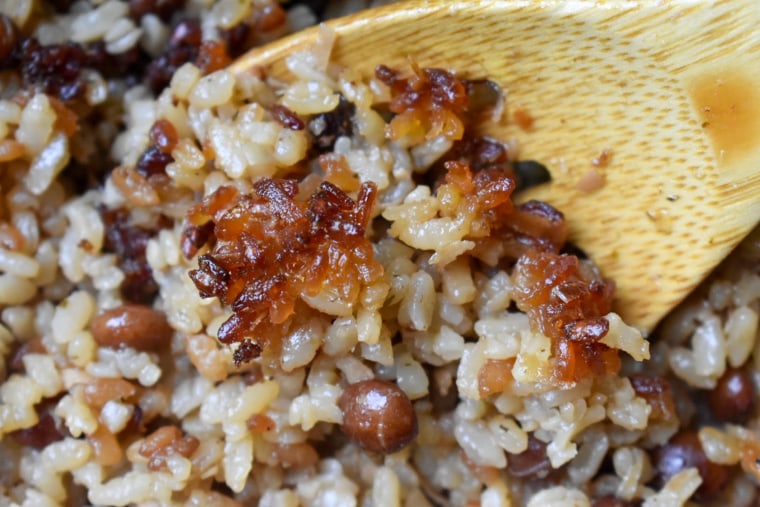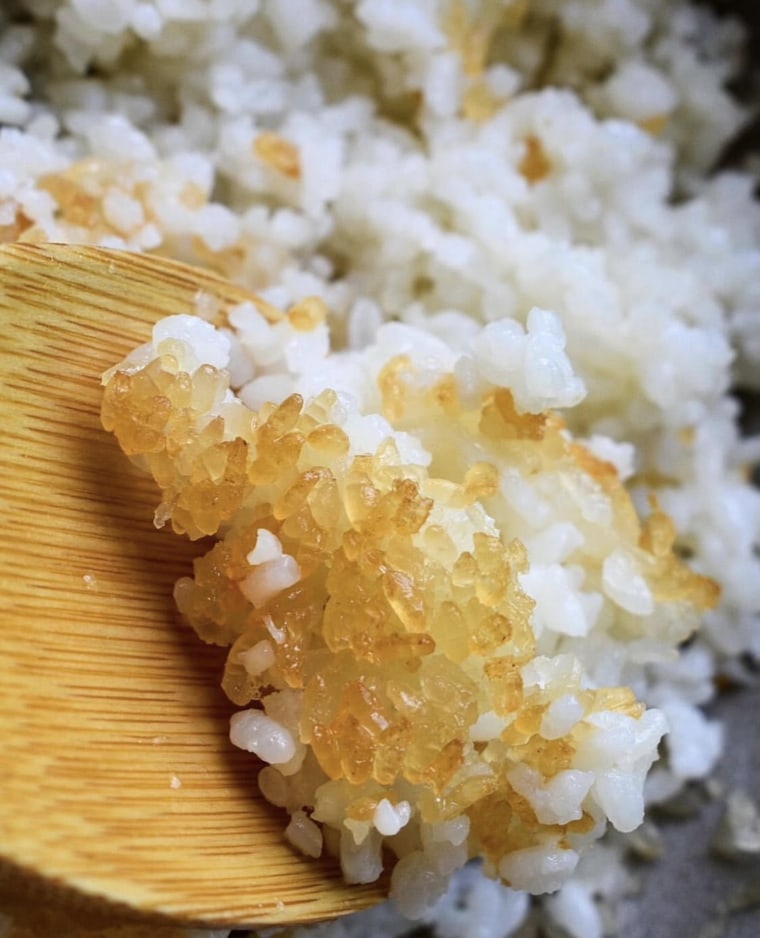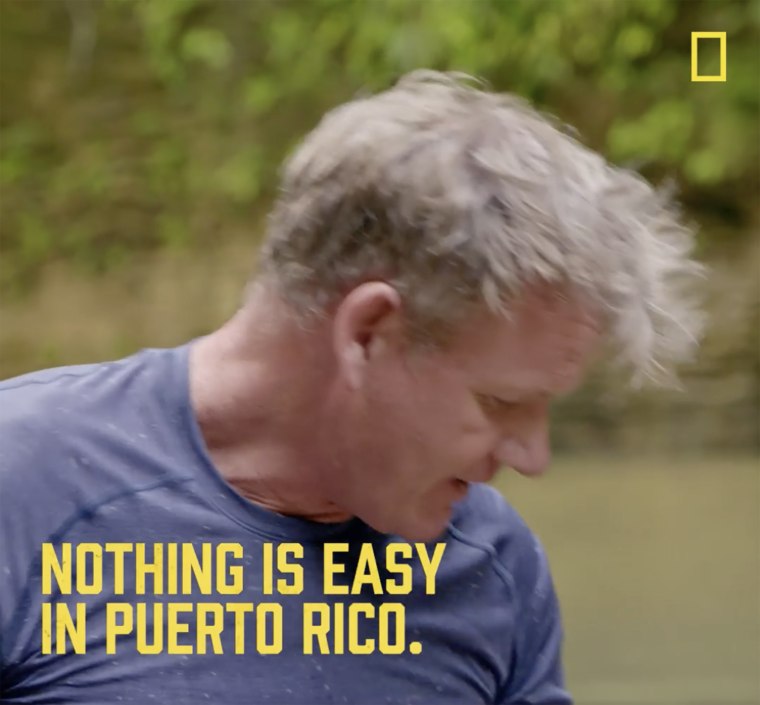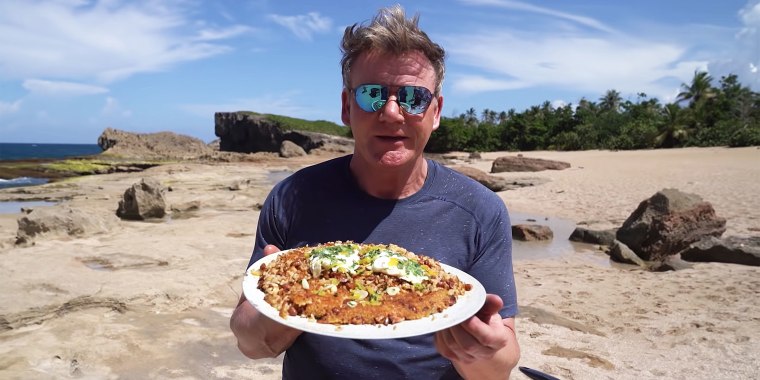Chef Gordon Ramsay made a name for himself as a man of exacting standards who demands nothing less than perfection from the cooks in his kitchens, but it was a video of his own cooking this week that drew scathing critiques on Twitter for his take on Puerto Rican pegao rice. Though some viewers seemed pleased he was bringing attention to the island, others were disappointed by his approach.
The video is from his YouTube series "Scrambled: On the Road," a digital companion to his National Geographic travel show "Gordon Ramsay: Uncharted" (a show which has itself received quite a bit of criticism for its approach to exploring international cuisines). The clip features the chef guiding viewers through a recipe that some say bears little resemblance to the Puerto Rican pegao he says it is.
Though later changed, the title of video in question was first posted as "Can Gordon Ramsay Elevate a Puerto Rican Rice Dish?" and in the segment, he happily promises to do just that, first calling it a “beautiful dish,” then asking, "How do you elevate that? How do you lift that up to the next level?”
For those of us whose cuisines are regularly deemed "ethnic" or "other," the word "elevate" already serves as a red flag. Why does the cuisine need elevating? And why would a nonexpert in the cuisine think they can make it better?
In the video, waves crash against the rocks behind him while he cooks what he says is pegao but in actuality resembles more of a fried rice or even another Puerto Rican dish, arroz mamposteao.
To some of us who grew up eating Puerto Rican pegao, the demonstration was equal parts confusing and infuriating.
Imagine, for example, the absurdity of watching a video featuring a chef assembling an elaborate fruit salad while all the while referring to it as the "the most amazing smoothie."
“this isn’t pegao this is a hate crime,” said Twitter user @AntillanaSoy in reference to a TikTok clip of the original video.
Others on social media echoed that Ramsay’s dish was definitely not pegao, and joined in with jokes, Ramsay-style insults and other, more nuanced critiques.
Puerto Rican-born chef and recipe developer Reina Gascon-Lopez, who tweets as @sofritoproject, got to the heart of what many of us with true knowledge of the island’s cuisine were feeling:
“It’s just frustrating to see white male chefs get applauded for doing the bare minimum (and incorrectly, for that matter) about cuisines they know nothing about and then get heralded as experts," she tweeted.
Frustration seemed to be a common reaction to Ramsay’s interpretation of pegao from other Puerto Rican chefs and food writers.
“What’s most problematic here is that with the reach and size of his audience, his fans are going to take what he says at face value, even when a dish is incorrectly named and/or executed,” Gascon-Lopez told me.
Illyanna Maisonet, a food writer and author of the forthcoming Puerto Rican cookbook, "Diasporican," pointed out the issue of having a network like National Geographic promoting a white, non-Puerto Rican chef’s recipe when so many others with actual knowledge and skill are regularly excluded from the conversation.

“How many Puerto Rican chefs have you seen on television cooking arroz con gandules?” she asked me, noting how often food professionals like her who have “dedicated (their) lives to documenting Puerto Rican food” still have to “beg and plead” for national attention, while celebrities like Ramsay are given a free pass with seemingly little pushback or questioning.
Neither Gordon Ramsay nor National Geographic responded to requests for comment.
What is pegao?
To understand the backlash, it’s important to understand what pegao is and what it means to many Puerto Ricans. The word itself is a colloquial form of the Spanish word “pegado,” which translates to “stuck.” Within the context of Puerto Rican food, pegao refers specifically to the crispy, thin layer of rice that sticks to the bottom of the pot when making traditional island rice dishes like arroz con gandules (rice with pigeon peas). It’s not an easy technique to master, and all the chefs I spoke to were quick to note it took them years to learn.

In his video, Ramsay talks about pegao as though it’s a dish in itself, but it's really more of a feature of another dish. To declare that you are about to make (or teach!) pegao is akin to roasting a whole chicken and referring to it only as "crispy chicken skin."
Gascon-Lopez calls pegao “the end result of cooking a pot of rice," pointing out that “you can’t just make it by itself without the rest of the rice along with it."
Eric Rivera, chef and owner of the restaurant Addo in Seattle, who responded to Ramsay’s video with an incisive thread pointing out the issues with the demonstration, hints at the joy Puerto Ricans feel when they think about pegao by calling it “the buried treasure” and the “byproduct of a baller dish.”
Rivera explained, “Pegao is probably the most sought after part of a rice dish … The supply is scarce but one bite is the best bite …"
It’s precisely the lifelong memories, and the love so many of us have for pegao, that struck a chord and led to the passionate backlash.
In an attempt to figure out how Ramsay developed his recipe, I watched the full Puerto Rico episode of "Uncharted."
The exoticization of Puerto Rico
The premise behind the show is typical of the genre, reminiscent of Bobby Flay’s mid-aughts Food Network series "Throwdown!" In each episode, Ramsay visits a country and spends a few days taking part in pseudo-adventures in search of ingredients he will then use to challenge a local chef in a final cooking competition to see who can prepare the best versions of the local cuisine.
In defense of the show, Ramsay noted in 2018 to Entertainment Weekly that the concept allows him to highlight “some of the best (culinary) talent that hasn’t been noticed yet.”
In the episode I watched, I didn’t see him highlight unnoticed culinary talent. The featured local chef is Jose Enrique, likely one of the most celebrated and awarded chefs on the island. Jose introduces Ramsay to a variety of food producers who are mentioned only by first name, with the exception of Draco Rosa, the former Menudo and famed music producer who now owns a coffee farm in Utuado, Puerto Rico.
Even more outrageous for an island where much of the food and traditions are prepared and shared by our mamás, tias and abuelas was the near-total lack of women. It's not until 30 minutes into the show that we meet the only Puertorriqueña in the entire episode, a farmer named Suley who teaches Ramsay how to harvest vegetables for a few minutes.

Ramsay repeatedly mentions how "resilient" Puerto Ricans are, noting that, in Puerto Rico, "everything is hard,” as he takes part in various adventure challenges around the island like a culinary Indiana Jones. He jumps out of a helicopter that "doesn’t have permission to land" in search of coffee, rappels down a mountain to meet a shrimp catcher and makes a big to-do out of the "terrifying" flight on a small plane to the smaller Puerto Rican island of Culebra, where he spearfishes for local snapper. The challenges are reminiscent of theme-park rides; the helicopter was hovering only about three feet off the ground when Ramsay hopped out, and the flight to the smaller islands (which I’ve taken!) is about 20 minutes long and, while not particularly luxurious, hardly something the host of an adventure series should take issue with. (Interestingly, nobody mentions the ferry, which is how most of the locals travel.)
As a chef and a Puerto Rican woman, the exotification of the island where my family is from, and lack of context about our food, was painful to watch. I understand that the purpose of television like this is entertainment; I’ve certainly taken part in silly hijinks on camera, but to do so under the guise of education is irresponsible and ultimately only serves to further exploit and perpetuate limiting myths and stereotypes about cultures that are repeatedly denied an authentic spotlight in mainstream food media.
It is true that in Puerto Rico right now, many things are hard, but it’s not because the people have to jump through "Survivor"-style challenges as they go about their day. Ramsay could have used the privilege of his platform to show how actual hardships like regular power outages, the impact of the 1920 Jones Act on the cost of food or the ongoing effects of Hurricane Maria directly impact the way people eat and cook. Instead of prioritizing celebrities and gimmicks, he could have spent more time with Suley or other food innovators who are doing the work to make the island more self-sustainable. Perhaps somewhere along the line, he would have even learned what pegao really is.
Ultimately, what is important to remember is that when people of a community or culture raise up our voices about things as seemingly innocuous as a cooking video, the plea isn’t really about ingredient amounts or technique. It’s about representation. It’s about respect. It’s about the right that we all, as residents of this earth, have to be seen, honored and heard.




